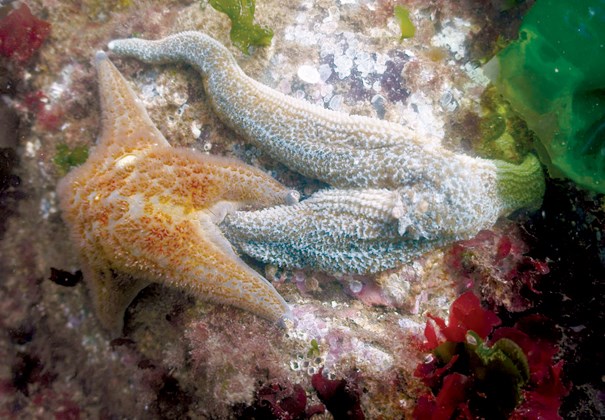Research staff at the Vancouver Aquarium say they still don't know what's causing a massive die-off of sunflower sea stars in the waters off West Vancouver, Howe Sound and elsewhere on the South Coast.
Donna Gibbs, a research diver with the Howe Sound Conservation and Research Group at the aquarium said divers who had been at Whytecliff Park first reported the problem last month. "Divers contacted us and said 'What's going on with the dead sea stars?'"
Since then, the die-off has been spreading quickly, said Gibbs.
Thousands of the large distinctive sea stars have been found dead or dying in waters off Bowen Island, Hutt and Popham islands and even up Indian Arm.
"They're dying everywhere," she said. "It happened really fast."
"They're melting. Their arms fall off and their bodies turn into goo."
Gibbs said scientists don't know so far what's causing the sea stars to die, but suspect it's caused by a disease.
The sea stars - which can grow up to two feet across and have 26 arms - were hugely abundant, numbering in the thousands at some of the locations where the die-offs are now occurring, said Gibbs. That scenario may have spread disease, she said.
In some places, like Lookout Point near Horseshoe Bay "They're all gone," said Gibbs. "It's just a pile of goo left."
Scientists have dubbed the disease a starfish "wasting syndrome."
Currently divers are trying to map the extent of the die-off and are hoping to get scuba divers to report in on it. One of the problems so far is that by the time any samples of the affected sea stars make it to the lab, they're too deteriorated to be any use, said Gibbs.
"We go to find them and there's nothing to collect," she said.
Scientists are concerned the syndrome is starting to affect other starfish species - from painted stars to sun stars.
But there's also some good news. Baby sunflower sea stars have also been spotted, said Gibbs. And so far, they don't seem to be succumbing to the wasting syndrome like the adults.
Gibbs said local waters aren't the only areas affected. "We're hearing rumbles about (the wasting syndrome) in Puget Sound and California," she said.
Other die-offs have happened in the past, she said. But this time, "the extent of it is just shocking."
Divers with information are urged to contact the research group at [email protected].



